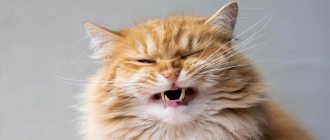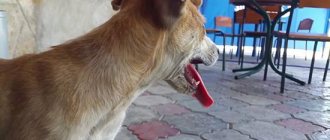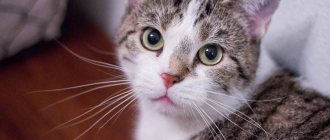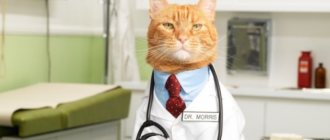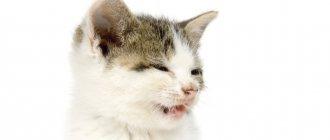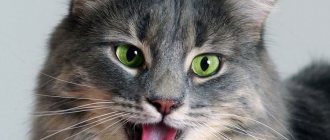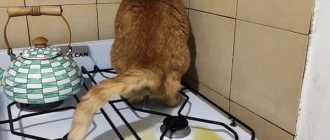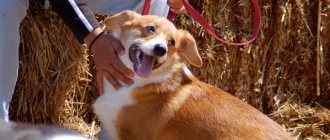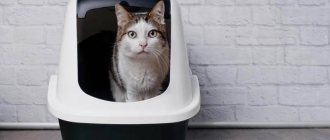Danil Ignatievich Safronov
veterinarian Petstory
When a cat coughs, owners often ask – is this normal? Basically, coughing is a protective reflex designed to remove foreign particles, mucus, and microbes from the respiratory tract. It is not always a cause for concern, but if the cough persists, you may need to consult a veterinarian.
- What can you do at home?
Why does a cat cough and wheeze, what diseases can there be?
A cat’s cough , as a rule, never occurs as an independent disease. Most often it is a symptom of other diseases.
These are not all the reasons why a cough may occur. More than 100 diseases are currently
which are accompanied by this reflex.
Therefore, if your cat is coughing , then this is an excellent reason to grab your pet and rush to the veterinarian, who will examine the furry cat and make the correct diagnosis.
Pneumonia
This disease most often affects individuals who are weakened due to a recent respiratory tract infection, as well as elderly, malnourished pets. Pneumonia usually becomes a complication of acute bronchitis. The symptoms of this disease coincide with the symptoms of other respiratory diseases. For this reason, correct diagnosis is extremely important.
Signs of pneumonia are as follows:
- dyspnea;
- cough;
- wheezing;
- hard breath;
- temperature increase;
- purulent discharge from the nasal passages;
- cyanosis of mucous membranes;
- swelling of the dewlap and supporting parts of the paws.
Immediate treatment is required, which includes vitamin therapy to better combat the disease, and antibiotics, expectorants, and immunoglobulins are also prescribed.
If coughing attacks occur repeatedly and are simultaneously accompanied by other alarming symptoms, then you must definitely visit a veterinarian who will prescribe adequate treatment and help restore the health of your beloved animal.
Diagnostics in a veterinary clinic
Diagnosis is based on identifying the cause of the cough. The veterinarian examines the animal and collects anamnesis. The owner must clearly describe the signs, frequency and nature of the cough, highlight some characteristic features, for example, blood, sputum production.
A cough with sneezing may indicate cat flu. If it is accompanied by wheezing, then most likely your pet has asthma. Sputum production coupled with weight loss and diarrhea indicates the possible presence of parasites.
Necessary diagnostic methods include:
- general and clinical blood tests;
- serological blood test;
- Analysis of urine;
- chest x-ray;
- ECG;
- tracheal endoscopy;
- organ biopsy;
- culture of bronchial secretions for microflora.
Until a particular diagnosis is confirmed, the veterinarian prescribes maintenance therapy to relieve coughing attacks.
Main symptoms
It is very easy to identify a cough in your pet. The cat unnaturally stretches its neck forward, tilts its head, and opens its mouth. He coughs with his mouth open, making characteristic sounds. From the outside it may seem that your four-legged pet is vomiting. Most often, vomit is released along with the cough.
If the cough is isolated, then this should not be a cause for concern. With the help of a reflex, the animal simply tries to relieve irritation on its own. It’s another matter if the cough is prolonged, accompanied by other signs, such as snoring and wheezing.
It should be noted that a cat may snore from time to time, for example, when there is a lack of water. She may sometimes experience wheezing - when the animal swallows too large a portion of food.
However, if the above symptoms are presented together and are accompanied by changes in behavior (refusal to eat, restlessness, decreased activity, weight loss, exhaustion, etc.), this is already a reason to visit a veterinary hospital.
How does the disease develop?
Asthma in cats develops gradually. It usually begins with a mild form, in which the frequency of coughing attacks is about 1-2 times a month. Many owners ignore this or simply lose sight of it when they are away from home (for example, at work or school). In the first stage of asthma, the cough lasts about 40-60 seconds, so the cat recovers quickly without outside help.
If you do not take any countermeasures at this stage and do not consult a doctor, the disease will continue to develop. This will entail an increase in the duration of coughing attacks, as well as the appearance of other symptoms (fatigue, loss of appetite, strange wheezing, etc.). You shouldn’t write off all these symptoms “at random” - this can lead to serious consequences, including suffocation.
Preventive measures
The following preventive measures will help reduce the risk of diseases accompanied by cough:
- Do not allow your pet to become hypothermic. Do not let the cat sleep on a cold surface, sit in drafts, or let it go outside during severe frosts and high humidity.
- Regularly ventilate rooms in the house and do frequent cleaning to eliminate the possibility of developing allergies or asthma.
- Avoid contact with sick animals.
- Do not let your cat lick or rub against outdoor shoes.
- Do not allow your pet to drink dirty water or eat foods that may contain helminth eggs (raw meat and river fish pose a particular threat).
It is important that the cat’s diet is balanced and contains vitamins and microelements. Respiratory diseases caused by viruses can be avoided through timely vaccination. It is also recommended to undergo a preventive examination by a veterinarian 2-3 times a year, even if there is no cause for concern at the moment. This will allow you to identify diseases at the very first, asymptomatic stages, prescribe the necessary treatment and quickly eliminate the pathology.
It is important to understand that a cat begins to cough if there are foreign objects, inflammation, or suppuration in its respiratory tract (due to worms, infection, tumor, etc.). Each cause of illness requires a specific treatment - there are no universal methods of therapy. Medicines for diseases that provoke cough are prescribed by a veterinarian after examination and tests.
Causes of wheezing
There are many factors why a cat coughs. Among the main ones are allergic reactions, foreign bodies in the respiratory tract, bronchial asthma, helminths, inflammatory processes in the lungs, viruses and heart disease.
An allergic reaction in a cat occurs when an irritant enters the respiratory tract. Allergies can be caused by household dust, chemicals (detergents, aerosols, tray fillers), low-quality dry food and chemicals used for repairs.
Some cats suffer from allergies caused by seasonal flowering plants. Cough also occurs in cats whose owners smoke. When the animal breathes, gurgling and wheezing sounds can be heard.
Another cause of coughing in a cat is foreign objects stuck in the throat or nasal passages. These can be small bones and objects, as well as trichobezoars (balls of hair). In this case, the cat coughs and wheezes, trying to clear its throat and get rid of the irritating object.
Bronchial asthma is a dangerous condition of the animal’s body, the symptom of which is a strong, lingering cough and a general deterioration in the pet’s condition. Asthma is often associated with a genetic predisposition and can occur as a result of common allergies.
Cough can also be caused by helminthiasis. This is one of the most commonly diagnosed causes of animal cough.
Cat owners mistakenly believe that parasites exclusively affect the intestinal tract. In fact, lungworms are much more dangerous and often fatal, affecting the animal's respiratory system.
During breathing, the cat can hear wheezing, provoked by increased mucus production to quickly get rid of cysthelminths.
Pneumonia is a disease that affects the lower parts of the respiratory system. It usually occurs against the background of bacterial and viral infections of the respiratory tract, rarely developing independently. In addition to coughing, the animal experiences breathing disturbances, a large amount of sputum and mucus produced, a deterioration in the animal’s general condition and an increase in body temperature.
The cause of a specific reaction of the body in the form of a cough can be all kinds of viral infections that affect the nose, pharynx, bronchial tree and lungs. The most dangerous are viral rhinotracheitis and calcivirosis. In addition to coughing, the cat is diagnosed with apathy, depression of general condition and refusal to eat. Viral infections are often accompanied by an increase in body temperature to high levels.
Diseases of the heart muscle that provoke coughing are rarely diagnosed in domestic cats. If there is a disturbance in the functioning of the heart, the visible mucous membranes become cyanotic, shortness of breath and depression of the general condition are observed.
The owner of a mustachioed pet should carefully monitor the nature and strength of the cough, noting other accompanying symptoms. It is not recommended to self-medicate, since without an accurate diagnosis it is not possible to make a diagnosis and prescribe treatment. Moreover, by delaying a visit to a specialist, the owner only makes things worse. Especially when it comes to foreign bodies stuck in the respiratory tract, because the animal can die.
Signs and types of wheezing
When observing how a pet coughs, one involuntarily draws an analogy with a human cough. But unlike a person, when coughing they stand in a certain position, stretching their neck forward as much as possible, making sounds reminiscent of an attack of vomiting.
By its nature, the cough mechanism is carried out as a result of strong irritation of the receptors of the mucous membrane lining the respiratory tract (nasal passages, bronchial tree or the lungs themselves).
Quite often, the cause of a severe cough in a cat is inflammatory processes occurring in the respiratory tract. As a result of a developed pathological process, a large accumulation of a specific secretion – mucus – occurs in the lumen of the larynx.
The body is trying to get rid of the irritating factor. A signal is transmitted to a certain center of the brain, transmitted along nerve endings, provoking irritation of the cough center. From this center impulses go to the larynx. Against the background of this process, the muscle fibers located in the larynx under the influence of the reflex contract.
When exhaling, the glottis is open, which is why a specific sound called a cough occurs. The owner’s task is to promptly detect such a sound being made and the posture being taken. This will make it possible to promptly contact a specialist for help, preventing the development of possible complications.
It is necessary to know what types of cough exist in veterinary medicine, their characteristic features and the consequences they have for the normal condition of the pet.
Veterinarians divide cough in domestic cats into several types. The cough can be acute or chronic.
The acute form of cough is characterized by a sudden appearance of the reflex, and the duration ranges from several days to 1 week.
A chronic type of cough can last from several weeks to several months.
Coughs are also classified according to their sound - muffled and loud, and according to the nature of the accompanying discharge - dry or wet.
In turn, the dry type of cough has its own symptoms. The cat wheezes, and the cough that escapes is abrupt and loud.
The wet type of cough is characterized by the appearance of peculiar gurgling sounds, accompanied by the release of mucous secretions, sputum, or even blood.
The time of day when a dry or wet cough appears is completely unimportant.
With a weak cough, the animal does not particularly strain. But for a strong one, the following clinical picture is typical - the cat coughs and wheezes, stretching out and snuggling, as if she had nausea and vomiting.
The pet owner should note any peculiarities when the cat coughs, which will allow the veterinarian to create a more accurate picture of what is happening when collecting an anamnesis and determine the exact factor that provoked the pathology. In addition, a detailed medical history makes it possible to choose the correct and most effective treatment tactics.
If there is not only a cough, but also a stuffy nose in a cat, this type of pathological process is called respiratory. Body temperature may increase, and the general condition is depressed.
A set of symptoms along with a cough may indicate the onset of an inflammatory process in the lungs or bronchial tree. Characteristic symptoms do not appear immediately, but after a certain period of time. With increasing symptoms, the cough will be loud and dry, without secretions of specific secretions, sputum and blood.
Another type of cough is also defined in veterinary medicine – cardiac. The cardiac type of cough develops due to pathological processes occurring in the myocardium. This cough is not accompanied by the production of sputum and mucus.
The main cause of cardiac cough is severe thickening of the myocardial walls or the accumulation of pathological exudate in the pulmonary structures, provoked by disturbances in the circulatory system. With a cardiac cough, the following symptoms are observed - the cat is breathing heavily, as if she does not have enough air. Instead of nasal breathing, inhalation through the mouth is noted.
A cough can occur as a result of irritation of the mucous membranes by foreign protein components - an allergic reaction. With a weak reaction, the pet may simply cough from time to time, and there may be discharge from the nose.
Severe allergies can cause coughing to such an extent that the animal begins to choke. In such cases, it is necessary to urgently contact a 24-hour veterinary clinic for immediate help.
Types of cough and its causes
- A dull, non-stop cough, in which the animal cannot breathe and saliva flows from its mouth, usually occurs when a foreign object enters the larynx.
- Frequent barking cough is often caused by swelling of the larynx, which is the result of an allergic reaction.
- Paroxysmal cough with suffocation occurs in asthma.
- Dry breathing accompanied by wheezing is usually a sign of cardiovascular disease, tumor or infectious disease.
- A gurgling cough accompanies diseases and pathologies in which a large amount of pus is released in the respiratory organs (helminthic infestations, infectious diseases).
If a cat coughs periodically, producing a small amount of sputum during coughing, which may contain streaks of blood, this may indicate myocardial pathology or the presence of a tumor in the animal’s respiratory tract.
The preliminary cause of an animal’s cough can be determined by its nature. However, to make an accurate diagnosis, you should immediately show your coughing pet to a specialist, who will quickly determine the cause of the ailment and then prescribe the necessary treatment.
Cough in combination with other symptoms
Cough is often accompanied by other symptoms that can serve as indicators in making a diagnosis.
With a sneeze
Coughing along with sneezing is most often a sign of an incipient respiratory disease. An infection localized to the nasal passages causes the cat to sneeze and develop a runny nose. However, some of the liquid does not come out through the nose, but goes down into the throat, causing a cough.
With wheezing
Wheezing is a classic sign of feline asthma; most often they are accompanied by coughing, difficulty and rapid breathing, while the pet’s mouth remains half open.
With hairballs
“Coughing up” hairballs actually has nothing to do with coughing as such; the cat tries to regurgitate the lumps from the digestive tract, rather than expel them through the respiratory tract.
Diagnostics - methods and methods
Diagnostic studies begin with a history taking. Here it is important to tell the doctor everything that you were able to notice: the nature of the cough, its intensity, the time of onset, the presence of vomiting.
Be sure to inform about the type of feeding and the presence or absence of unwanted contacts with allergens and hazardous substances. Next, the doctor will conduct a general examination of the animal: check the mucous membranes, pharynx area, and root of the tongue. Foreign objects can be detected at this stage, which will be the final diagnosis.
A mandatory examination for coughing is a chest x-ray. Usually a lateral projection of the animal is sufficient. At this stage, foreign bodies can also be detected, and a diagnosis is made - the patient is transferred to the hands of surgeons.
A cardiac (cardiac) cough will be shown by a chest x-ray, echocardiography and electrocardiogram. If tumors are detected in the respiratory tract of a cat, a consultation with an oncologist is necessary - he will decide what to do.
Blood tests are always carried out: general clinical and biochemical. The doctor listens to the animal: lungs, bronchi, trachea. If a certain pathology is suspected, additional studies are prescribed: fluoroscopy of the esophagus with contrast, laryngo-, tracheo-, broncho-, esophagoscopy. A culture of bronchial secretions and a biopsy may be necessary for microflora. Until a final diagnosis is made, the veterinarian will prescribe supportive treatment for your pet to relieve cough symptoms.
The main therapy should be aimed at curing the disease that caused the cough syndrome. It is prescribed by a doctor only after a final diagnosis has been made.
Asthma attacks
Bronchial asthma is a chronic disease of the respiratory tract. It is allergic in nature and is not associated with bacterial growth. The nature of development is most often genetic, but sometimes acquired pathologies occur. The signs of the disease are as follows:
- severe coughing attack;
- dyspnea;
- restless state;
- hoarse breathing;
- pronounced cyanosis is visible on the mucous membranes;
- increased drowsiness;
- refusal of food;
- the pet takes a forced position - lowers its head and stretches its neck, trying to cough up phlegm;
- in severe cases, eye rolling and loss of consciousness may occur.
To accurately establish a diagnosis, tests are taken from the animal, a hardware examination of the abdominal and chest cavity is performed, and then treatment is prescribed. It includes taking antispasmodics, antibacterial drugs, as well as vitamin complexes, especially vitamins C and E, which are natural antioxidants. It is also recommended to purchase an inhaler that will help relieve the attack and prevent your pet from suffocating.
Main causes of cough in cats
Veterinary experts identify 6 main causes of cough in cats.
- Bronchial asthma. This is one of the types of allergies that occur in a cat to foreign components that can be contained in dust, pollen, hair from other pets, dead particles of human skin, as well as in medications and chemicals.
- The presence of foreign objects in the upper respiratory tract, esophagus or stomach.
- Pathologies of the cardiovascular system.
- Helminthic infestations. During migration, Toxocara larvae enter the lungs. This most often occurs in young animals due to untimely deworming after weaning. In this case, the kitten coughs heavily and may vomit a foamy mass in which parasites are found. The cat may also cough constantly due to the presence of heartworms in the pulmonary arteries. These thin, long helminths parasitize the heart, pulmonary artery and small capillaries. They clog blood vessels, which causes frequent severe coughing, vomiting, shortness of breath, loss of appetite, and in case of severe infestation, convulsions and death.
- Infectious diseases of the upper respiratory tract. The most common diseases include herpes, rhinotracheitis and calicivirus.
- Pneumonia. The etiological factors for the occurrence of pneumonia in cats are pathogenic bacteria, viruses, microscopic fungi, as well as external factors such as hypothermia, eating cold food, and keeping the animal in unsanitary conditions.
- Malignant tumors in the respiratory organs.
Important! Among infectious agents, a special place is occupied by the pathogenic bacterium Bordetella bronchiseptica, which causes bordetellosis. Most often, this disease is transmitted by airborne droplets when cats are kept in crowded conditions in nurseries. The infection is also spread by stray cats, which can infect free-roaming pets.
If the cat is coughing heavily and breathing heavily, then the cause of this condition may be pneumo- or hydrothorax, caused by the penetration of air or liquid into the chest cavity.
Treatment of cough at home
Therapy is determined by the complexity of the pathological process and is aimed at eliminating it:
- For invasive cough, antiparasitic procedures are prescribed, and in the future it is recommended to regularly prevent the disease.
- Attacks due to cardiac problems are eliminated by comprehensive treatment of the cardiovascular system and general cough suppressants.
- The specificity of antiviral and antibacterial therapy is determined by the characteristics of the cough: expectorants are prescribed for dry coughs, and antitussives for wet coughs.
- Asthmatic attacks are stopped by hormonal and glucocorticosteroid, antiallergic drugs.
- Special creams and pastes improve the condition of trichobezoar They cover the surface of hairballs and facilitate their natural release.
- Cough from injuries to the respiratory organs and throat subsides as they heal. If internal organs are injured, the pet is given crushed food. For external wounds, treatment methods depend on the severity of the pathology. In serious situations, the wound is surgically sutured and antibacterial therapy is carried out.
Treatment of asthma in cats
Unfortunately, asthma has no cure. However, this is not a reason to do nothing and give up. Veterinary clinic specialists know how to control and prevent sudden coughing attacks that develop against the background of asthma.
One of the main tasks is to identify and eliminate allergens that lead to a deterioration in the pet’s condition. If asthma is triggered by allergic reactions, which are a common cause of the disease, then eliminating allergens will completely prevent attacks of prolonged asthmatic cough.
If the signs of asthma cause severe discomfort to the pet or his body is so weakened that it cannot fight the disease even if allergens are excluded, drug therapy is prescribed. The veterinarian assesses the pet’s condition and, based on the diagnostic results, prescribes medications:
- Bronchodilators (bronchodilators) . They are designed to quickly relieve asthma symptoms. They act by expanding the lumen of the bronchi, making breathing much easier. Typically, bronchodilators are prescribed by a veterinarian along with anti-inflammatory drugs - this ensures maximum effectiveness of treatment;
- Glucocorticosteroids . Hormonal drugs that help increase blood glucose levels. They are prescribed by veterinarians carefully, taking into account all the characteristics of the pet’s condition. Glucocorticosteroids increase glycogen production in the liver and enhance protein catabolism. However, their intake must be strictly controlled;
- Antibiotics . Prescribed during periods of exacerbation as an addition to the main therapeutic program. Antibiotics are intended to control secondary flora and eliminate bronchospasms. They are often used if asthma is caused by incompletely treated infections;
- Antihistamines . They relieve various signs of allergic reactions and prevent their development. Each cat will respond differently to a particular antihistamine, so in some cases it may be necessary to try multiple treatment options;
- Vitamin and mineral complexes . They contain vitamins and minerals necessary for the rapid restoration of the animal’s body, strengthening the immune system, returning physical activity and appetite. Such complexes speed up recovery and reduce the risk of complications.
Trust the treatment of bronchial asthma in a cat only to experienced veterinarians!
Helminths or allergies
A large number of worms can provoke a similar condition in pets. Helminth larvae irritate the mucous membrane of the throat, which causes wheezing and coughing. You can suspect a helminthic infestation in a cat based on the following signs:
- weight loss with good appetite;
- frequent vomiting;
- dull coat;
- presence of dandruff.
Once the diagnosis is established, the cat is prescribed antihelminthic drugs in the form of a suspension or tablets. After a week, a second course of therapy should be carried out if the invasion was severe. It is not recommended to delay treatment, since a large number of worms can cause intoxication of the body, cause damage to the kidneys, liver, or cause the death of the animal.
Allergies are another reason that causes coughing. It is necessary to identify the allergen and protect the furry animal from it. In advanced cases, drug therapy is used, which is prescribed by a veterinarian.
How to treat cat cough
If a cat is coughing, it can be treated at home only after being examined at a veterinary clinic, making an accurate diagnosis and prescribing appropriate therapy.
You should not self-administer cough suppressants before visiting a doctor, as this may change the clinical picture of the disease and make it difficult to determine the cause of the pathology.
Important! If the cat is coughing and wheezing, as if he is choking, then you should not take any independent action. It is better to quickly take your pet to the hospital or call a doctor at home. Delay can also be fatal when the cat wheezes, trying to burp, but only spits up saliva or foamy liquid.
If a cat coughs due to an infectious disease of viral etiology, the doctor prescribes:
- antibacterial drugs (Amoxisan, Sinulox, Tsiprovet) to prevent the development of secondary bacterial infections;
- mucolytic and expectorants (Bromhexine, licorice extract);
- immunomodulators (Cycloferon, Fosprenil, Maxidin);
- globulin Vitafel;
- intravenous injections of Ringer-Locke solution or saline with 5% glucose (to prevent dehydration when refusing food).
If the cough is accompanied by wheezing and the cat coughs while stretching its neck, then the cause may be pneumonia or another inflammatory process in the respiratory system. In this case, antibiotics are first prescribed. And to relieve coughing, the cat should be given antispasmodics, mucolytics and expectorants.
If a cat's cough is accompanied by vomiting, this often indicates helminthiasis. In this case, anthelmintic drugs are prescribed (Pyrantel, Prazicide, Drontal, Milbemax). Despite the fact that these medications are sold in pharmacies without a prescription, you should not use them yourself if your cat wheezes and tries to burp.
In case of severe infestation, an incorrectly selected dosage can lead to excessive activity of parasites and lead to suffocation. Illiterate actions by owners can also lead to intestinal rupture or excessive intoxication in small kittens.
If the reason that the cat is coughing and stretching its neck, as if choking, is trichobezoars, then the doctor will prescribe special pastes and gels to remove or dissolve hairballs in the stomach.
If a cat coughs and wheezes with its tongue hanging out, this may indicate an attack of bronchial asthma. You can quickly relieve an attack with:
- glucocorticosteroids (Hydrocortisone, Prednisolone, Dexamethasone, Fluocinolone);
- bronchodilators (Theophylline, Atropine);
- antibiotics (if there is a threat of infection by pathogenic bacteria).
Important! Self-administration of glucocorticosteroid and bronchodilator drugs to treat Sphynxes and other cats when they cough while stretching their necks can lead to overdose, complications and the development of side effects. Therefore, you should not put your pet’s life at risk; you must urgently take him to the clinic.
The reason that the cat is coughing, wheezing, as if he is choking, may be a heart attack, which develops in the cat as a result of a hidden pathology of the cardiovascular system. In this case, any independent treatment is unacceptable.
You should immediately call the clinic, call a veterinary specialist to your home and get a recommendation on the actions that need to be taken before his arrival.
What to do if your cat is coughing
Any attentive owner can independently determine the nature of a cat’s cough and even its type. But understanding the reason for what is happening, much less taking a set of measures necessary to heal your pet, alas, will not work at home. This will require a personal examination by a specialist, additional diagnostic tests and equipment that is only available in the clinic.
It is important to understand: a cat’s cough is by no means an independent disease, but only a symptom, “a manifestation of one of a hundred diseases,” as old veterinarians liked to say. You need to look for the cause and eliminate it - and not try to cure the cough itself.
Is it possible to help an animal yourself?
At home, you can only alleviate the cat's condition before visiting a veterinarian. The air in the room where the animal is located should be fresh and humid - ventilate the room, but under no circumstances leave a sick pet in a draft, this will only worsen the problem. Inhalation of steam, which should not be too hot, can bring relief to a cat - this procedure is available at home even without any special equipment.
Try to calm your pet as much as possible. Cats are very sensitive and emotional, sudden attacks can frighten them, causing the cough to intensify and the situation as a whole to worsen. Caress a confused animal - it trusts you and should feel that a loving owner will take care of it.
It is necessary to take a coughing pet to the doctor as soon as possible, because he will only be able to receive real help after a qualified diagnosis. It is also important not to give your cat any medications before visiting the clinic . Firstly, the effect of the drugs will “blur” the symptoms of the disease and complicate the diagnosis. Secondly, cough is not a harmless problem at all; only an experienced specialist has the right to prescribe medications for its treatment, and only if he has clearly determined the reasons for the manifestation of this symptom.
Medical assistance
Provided a clear diagnosis is made and the exact cause of the cough is determined, the doctor can use many modern tools to treat it. But the starting point of any successful healing was and remains an accurate and timely diagnosis.
Table: treatment prescribed for different types of cough
| Cause of cough | General therapy | Drugs |
| Heartworm |
|
|
| Cat flu and other infections |
|
|
| Bronchial asthma |
|
|
| Worm infestations |
|
|
| Traumatic cough |
|
|
| Polyps and tumors |
|
|
Video: treatment of cough in cats
Antitussives
It is strictly prohibited to use antitussive or expectorant drugs independently, without a doctor’s prescription. The wrong choice or inaccurate dosage of the drug may not cure the cat, but, on the contrary, worsen its condition - leading to complications of the disease and dangerous side effects.
But we hope that information about what antitussive drugs are will be useful for every owner. These drugs, according to the nature of their action, are divided into two large subgroups: blocking and expectorant. There are also medications that combine both of these qualities and have a complex effect - these are mainly human medications, and not all of them will benefit a cat.
“Harmless” cough syrups for children (as well as adults) are absolutely not suitable for cats. These pharmacy delicacies are not always useful for people, given the high content of sugar, flavorings, dyes and other improvers. There is definitely no need to give such medications to cats. Products that contain alcohol or codeine are also not suitable for them.
Blocking drugs are good because they quickly relieve the animal from painful and painful coughing attacks. But such medications do not treat its cause, but simply “turn off” the cough center, blocking its functions. The cough is thus masked as a symptom, but the disease is not treated and the situation worsens. Such drugs can only be prescribed as a component of complex therapy, but not on their own.
Expectorant antitussive drugs have proven themselves well in the treatment of coughs of an infectious nature. By liquefying thick mucus and facilitating its elimination, such medications help not only to make the animal’s breathing easier, but also to clear its respiratory tract of pathogenic microflora - bacteria and viruses that have become the causative agents of the disease.
Table: veterinary cough medications for cats
| Drug name | Release form | Action | Approximate price |
| Divopride | Cough tablets for dogs and cats |
| 120 rubles per pack of 50 tablets |
| VetExpert VeTussin | Cough syrup for dogs and cats |
| 100 rubles per bottle of 100 milliliters |
| ZooHealth | Cough tablets for dogs and cats |
| 60 rubles per pack of 20 tablets |
| Helvet Lobelon | Homeopathic antitussive drug for the treatment of respiratory diseases, solution for injection |
| 350 rubles per bottle of 10 milliliters |
Medicinal herbs and cough preparations
Treating a cat’s cough with folk methods and herbs at one’s own discretion, and not on the doctor’s recommendations, can cause no less harm than drug self-medication - it is easy to transfer the disease to a critical stage, but sometimes it is simply impossible to reverse it.
You cannot indiscriminately recommend remedies from a natural pharmacy to treat a cat’s cough - even when using the safest of them, you should largely rely on the experience and advice of a veterinarian you trust. If the doctor does not mind, the natural preparations listed below can be used for kittens and pregnant cats, using them both internally and in the form of inhalations.
Licorice root decoction
An ancient herbal remedy for soothing coughs and removing phlegm. Effective, hypoallergenic.
Ingredients:
- crushed licorice roots - 1 heaped tablespoon;
- purified water - 1 glass.
Dried licorice root must be finely chopped before use.
Application:
- Medicinal raw materials are poured with cold water in the evening and left to infuse until the morning.
- Over low heat, bring the mixture to a boil under the lid.
- Reduce the heat to low and boil the broth for 12–15 minutes.
- Cool and filter.
- Adult animals are given an incomplete teaspoon of decoction three to four times a day, without combining with meals.
Infusion of coltsfoot leaves
One of the most famous medicinal plants with a strong expectorant effect.
Ingredients:
- dry or fresh coltsfoot herb - 1.5–2 teaspoons;
- boiling water - 1 cup.
For infusions, the entire aerial part of the coltsfoot is used, but most often the leaves
Application:
- Rub the medicinal raw material a little in your palms and pour it into a thick-walled (preferably ceramic) bowl.
- Pour freshly boiled water over the prepared coltsfoot, cover tightly with a lid and leave in a warm place for 30–40 minutes.
- Filter the finished infusion and pour into a clean container.
- Give to a sick cat three times a day to improve expectoration, warming the infusion before each dose.
Infusion of plantain leaves
An excellent healing and anti-inflammatory natural remedy; removes phlegm well and promotes tissue regeneration.
Ingredients:
- freshly picked plantain leaves - 1-2 pieces;
- hot water - 0.5 liters.
Whenever possible, use plantain leaves fresh rather than dried.
Application:
- Wash the plantain leaves thoroughly with running water and let them dry.
- Tear the leaves into small pieces - it is better not to use scissors or metal knives for chopping.
- The crushed raw materials can be slightly ground with a pestle in a non-metallic mortar.
- Pour well-mashed plantain leaves with boiled water not hotter than 70 degrees, seal tightly and wrap.
- After complete cooling, strain the infusion.
- Give the cat a teaspoon four to five times a day until complete recovery.
Medicinal plants can provide many benefits if used correctly
Also among the effective natural cough remedies are the following medicinal plants:
- wild rosemary;
- eucalyptus;
- oregano;
- anise fruit;
- birch and pine buds;
- linden flowers;
- elecampane;
- tricolor violet;
- lungwort;
- thyme, etc.
Herbal medicinal raw materials for the treatment of cough in cats are no less effective and safer than many medications, even those made on a natural basis. But the main problem with the use of such drugs in veterinary medicine remains the unpredictability of the animal’s response to a particular plant, especially as part of preparations.
Veterinarians report a large number of allergic reactions that occur in cats during such treatment. Need I say how dangerous this is - for example, in the case when coughing is a symptom of bronchial asthma? Obviously, when choosing useful plants in nature for self-medication, animals are fully guided by instincts and do not make fatal mistakes. And our inept care can too often harm them.
Features of cat cough
To establish an accurate diagnosis, the doctor will definitely interview the owner about the nature of the cough and its characteristics.
Characteristics of cat cough:
| Occurrence frequency | Rare Frequent Constant |
| Force | Mild coughing Harrowing Exhausting to the point of vomiting |
| Character | Paroxysmal wheezing With wheezing |
| Duration | Acute Protracted Chronic (lasting more than 2 weeks) |
| Type of manifestation | Dry or unproductive without phlegm. Wet or productive with sputum production. This is noticeable because the cat swallows something after clearing its throat. It is rare for sputum to fly out of a cat's mouth when coughing. |
| Appearance time | Morning Afternoon Evening |
When observing your pet, you should try to determine the type of cough based on these parameters, so that you can then tell the veterinarian. It’s better to make a video so that the doctor himself can conduct the assessment.
